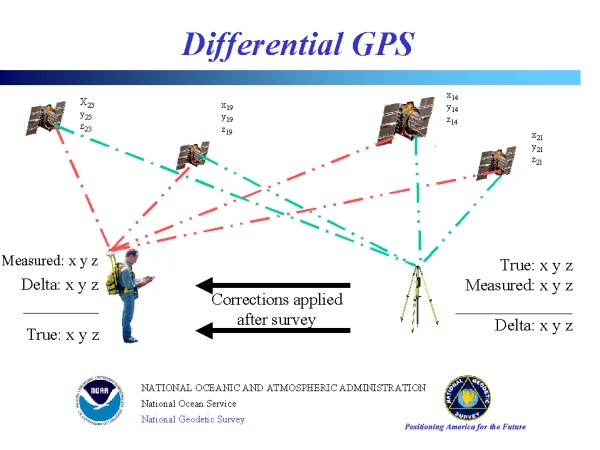TELECOMMUNICATION ~ Difference between GPS and DGPS
GPS and DGPS are satellite navigation systems. The key difference between GPS and DGPS is their accuracy, DGPS is more accurate than GPS. DGPS was intentionally designed to reduce signal degradation.
GPS provides an accuracy of about 10 meters, but DGPS can provide an accuracy of about 1 meter, even beyond 10 cm.
Definition of GPS:
Global Positioning System (GPS) provides the precise position of an object to the earth. It uses timely signals generated by satellites orbiting the Earth. GPS consists of a constellation of 24 satellites and an additional one for backup purposes. Four satellites are used to obtain the precise position, this process is known as trilateration.
GPS technology uses stand-alone receivers, where the location is directly calculated. This technique can have errors such as uncorrected satellite clock errors, orbital satellite errors, ionospheric and tropospheric delays, multipath errors, geometric errors and data selection errors. To reduce these errors, new technologies have evolved. GPS can achieve a nominal accuracy of 10-15 meters.
Definition of DGPS:
 |
| Source: wikipedia.org |
It reduces or eliminates signal degradation, which improves accuracy. The purpose of differential GPS is not to go directly to the location; rather, it finds the location relative to a fixed reference point. DGPS relies on two receivers rover and reference receiver, rover is the user, and the reference receiver is also known as the stationary receiver.
The stationary receiver is fixed and its position is known by the system. The satellite information is continuously transmitted to the phone and the base station tower. The base station tower uses its known position to calculate the exact timing. The fixed receiver sends the information to the mobile receiver to correct the measurements using the relative position of the fixed receiver.
Key differences between GPS and DGPS:
- In GPS, there is a stand-alone receiver that receives signals from the satellite while in DGPS there are two receivers, reference receiver and mobile (user) where the mobile receives a calibrated signal from the reference receiver (fixed base station).
- The accuracy of the GPS system is about 15 meters. On the other hand, DGPS is more accurate and can reach an accuracy of 10 cm.
- GPS equipment covers a wide range and can be used globally while DGPS equipment covers a short range up to 100 km, but this range can change depending on the frequency band.
- The GPS system is less expensive than the DGPS system.
- The frequency of the signal transmitted by the satellites in GPS varies between 1.1 and 1.5 GHz. In contrast, in DGPS, the satellites do not transmit a fixed frequency range, the transmitted frequency depends on the agencies.
- Factors that affect the accuracy of the GPS system are selective availability, satellite timing, atmospheric conditions, ionosphere, troposphere and multipath. In contrast, the DGPS system is affected by transmitter-to-mobile distance, ionosphere, troposphere and multipath, but to a lesser extent.
- GPS uses the WGS84 time coordinate system which is a fixed, Earth-centered, geodetic Earth system. DGPS on the other hand uses a local coordinate system.
In short:
The Differential Global Positioning System (DGPS) is a more accurate technology than its predecessor Global Positioning System (GPS). Accuracy in DGPS is improved by using two receivers instead of one, which finds the precise location using relative positions.-
Comments
Post a Comment